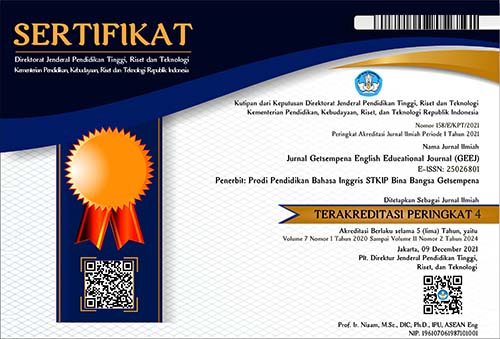TEACHING WRITING TO EFL UNIVERSITY STUDENTS: SOME IMPORTANT ISSUES
(Reducing Writer’s block and Breakthrough to Better Teaching)
Abstract
This article discussed that the students’ difficulties in writing can be triggered by a lot of factors, but to solve those difficulties is never ending story. While correction of piece of writing is believed can helped students improve their writing, but the fact that the implementation of correction still cannot solve the problem. Moreover, students tend to be apprehensive. Writing apprehensive is dealing with the anxiety about writing. Students feel fear when they are assigned to write a piece of writing. This nevertheless, is a problematical issue that needs to be solved by the writing instructor or teacher. Some experts stated that writing apprehension can be caused by several factors, such as lack of writing strategies, inappropriate teachers’ writing teaching techniques, inappropriate contain of writing textbooks, and the students’ cognitive. Therefore, a better teaching instruction perhaps will minimize students’ apprehension in writing. This article tries to give an insight for a better teaching writing and how to deal with the problem that the students face when writing.
References
doi:10.5539/ies.v6n11p130
Al-Shboul, Y., & Huwari, I.F. (2016). Student's Strategies to Reduce Writing Apprehension (A Case Study on Zarqa University). Mediterranean Journal of Social Sciences, 7 (3). 283-290. Doi:10.5901/mjss.2016.v7n3s1p283
Badger, R. & White, G. (2000). A process genre approach to teaching writing. ELT Journal, 54(2), 153- 160.
Badrasawi, K.J.I., Zubairi, A., & Idrus, F. (2016). Exploring the relationship between writing apprehension and writing performance: A qualitative study. International Education Studies, 9 (8). 134-143. doi:10.5539/ies.v9n8p134
Bishop, W. (1989). We're All Basic Writers: Tutors Talking about Writing Apprehension. Writing Center Journal, 9(2), 31-42.
Daly, J. A., & Miller, M. D. (1975b). Further studies on writing apprehension: SAT scores, success expectations, willingness to take advanced courses and sex difference. Research in the Teaching of English, 9, 250-256.
Erkan, D. Y., & Saban, A. İ. (2011). Writing performance relative to writing apprehension, self-efficacy in writing, and attitudes towards writing: A correlational study in Turkish tertiary-level EFL. The Asian EFL Journal Quarterly, 13(1), 164-192.
Ghabool, N.(2012). Investigating Malaysian ESL Students' Writing Problems on Conventions, Punctuation, and Language Use at Secondary School Level. Journal of Studies in Education, 2(3). 130-143. http://dx.doi.org/10.5296/jse.v2i3.1892.
Hanna, K. J. (2010). Student perceptions of teacher comments: Relationships between specific aspects of teacher comments and writing apprehension. Ph.D Dissertation, The University of North Dakota.
Hassan, B. A. (2001). The relationship of writing apprehension and self-esteem to the writing quality and quantity of EFL university students. Retrieved February 19, 2004 from ERIC Database #ED459671
Ho, B. (2006). Effectiveness of using the process approach to tech writing in six Hongkong primary
classroom. Perspective: Working papers in English and Communication, 17(1). 1-52.Leki, I. (1995). Coping strategies of ESL students in writing tasks across the curriculum. TESOL Quarterly, 29(2), 235-60.
Horwitz, E. K. (1991). Preliminary evidence for reliability and validity of a foreign-language scale. In F. K. Horwitz,& D. J. Young (Eds.), Language anxiety: From theory and research to classroom implications (pp. 37-39).Englwood Cliffs, NJ: Prentice Hall.
Jahin, J.H.(2012). The Effect of Peer Reviewing on writing apprehension and essay writing ability of prospective EFL teachers. Australian Journal of Teacher Education, 37(11). 60-84. http://dx.doi.org/10.14221/ajte.2012v37n11.3
Kara, S. (2013). Writing anxiety: A case study on students’ reasons for anxiety in writing classes. Anadolu Journal of Educational Sciences International,3(1). 103-111.
Kirin, W. (2010). Effects of extensive reading on students’ writing ability in an EFL class. The Journal of Asia TEFL, 7 (1), 285-308.
Krashen, S. (2002). Explorations in language acquisition and use: The Taipei Lectures. Taipei: Crane Publishing Co.
Lee, S. Y. (2003). Teaching EFL writing in the university: Related issues, insights, and implications. Journal of National Taipei Teachers College, 16 (1), 111-136.
Mermelstein, A, D. (2015). Improving EFL learners’ writing through enhanced extensive reading. Reading in a Foreign Language, 27, 182–198
Mohamed, M., & Zouaoui, M. (2014). EFL writing hindrances and challenges: The case of second year students of English at Djillali Liabes. Journal of Educational and Social Research, 4(3). 149-156. Doi:10.5901/jesr.2014.v4n3p149.
Nunan, D. (1991). Language teaching methodology: A textbook for teachers. Prentice Hall.
Qamariah, H., &. Wahyuni, S. (2016). An analysis of EFL students’ paragraph writing: Errors and their causes. Proceedings of the 1st English Education International Conference (EEDIC) in conjunction with the 2ndReciprocal Graduate Research Symposium (RGRS) of Consortium of Asia Pacific Education Universities (CAPEU)between University Pendidikan Sultan Idris and Syiah Kuala University. Banda Aceh.
Singh, T.K.R., & Rajalingam, S.K. (2012), The relationship of writing apprehension level and self- efficacy beliefs on writing proficiency level among pre-university students. English Language Teaching 5(7). 42-52. doi:10.5539/elt.v5n7p42
Sun, C. (2009). Process approach to teaching writing applied in different teaching models. English Language Teaching. 2(1). 150-155.
Truscott, J. (1996). The case against grammar correction in L2 writing classes. Language Learning, 46 (2), 327-369.
Zitouni, N. (2015). Developing EFL students’ paragraph writing skills through teachers’ corrective feedback a case Study: Third year English students at Mohamed Khider University of Biskra. Dissertation. Mohamed Khider University of Biskra.

























